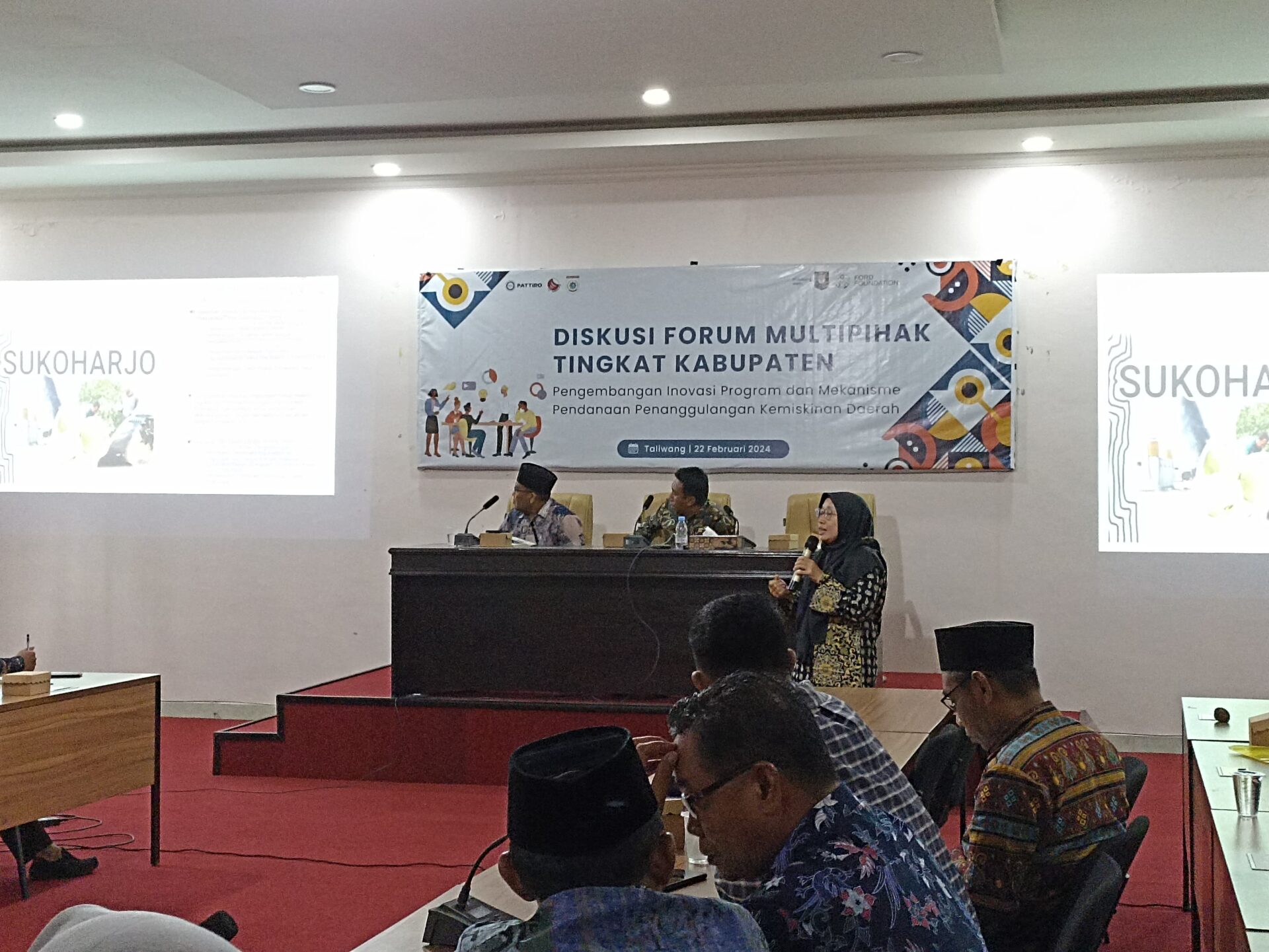
The Center for Regional Information and Studies (PATTIRO) states that the government needs to be careful and work hard, so that the mandate contained in Law No. 5/2014 on State Civil Apparatus (ASN Law) can be fully implemented starting January 2016. PATTIRO’s public policy research division study shows that the ASN Law mandates 19 Government Regulations (PP), 4 Presidential Regulations (Perpres), 1 Presidential Decree (Kepres), 1 Ministerial Regulation (Permen), 1 Ministerial Decree (Kepmen), and 1 State Civil Apparatus Commission Regulation (Per-KASN).
The government only has less than two years to prepare all regulations derived from the ASN Law. Although the Ministry of Administrative Reform and Bureaucratic Reform (Kemen-PAN-RB) stated that it will accelerate the completion of all derivative regulations, there are concerns from various parties that there will be delays as a result of the general elections and the change of government this year.
PATTIRO also sees several things that need to be studied more deeply from this ASN Law. For example, Article 9 paragraphs (1) and (2) state that ASN employees implement policies set by the leaders of government agencies, and ASN employees must be free from the influence and intervention of all groups and political parties. This freedom from political influence and intervention certainly includes the leaders of government agencies as ASN employees. Unfortunately, this intervention issue is not included in the explanation section of Article 9. Thus, it becomes unclear, how to ensure and what guarantees can serve as guidelines to free ASN Employees from political influence and intervention? The government must issue guidelines that firmly ensure and guarantee that there will be no such intervention. These guidelines must be made within the framework of KASN (State Civil Apparatus Commission) as well as within the framework of ASN employees in their daily activities.
Then, what about the work of KASN. The ASN Law illustrates that KASN has the same legal and policy powers as the Ombudsman Commission of the Republic of Indonesia (ORI), namely in the form of recommendations. Basically, the duties and functions of KASN are Supervision, Evaluation, and Development of ASN Employees. But unfortunately, the ASN Law has not explicitly explained the legal products of the results of supervision, evaluation, and guidance produced by KASN. When looking at Articles 31, 32, 33, and 34 of the ASN Law, it seems that KASN produces products in the form of reports on the results of Supervision, Evaluation, and Coaching, or in the form of Policy Paper (Proposal Paper / Policy Recommendation). This type of output product is not affirmative or does not provide strengthening to the bureaucratic reform process, so it is feared that the existence of KASN is only a complement to the ASN Law.
PATTIRO also questions what is meant by Merit System in the ASN Law. In the explanation section of the General Chapter, it is explained that what is meant by Merit System is a comparison between the qualifications, competencies, and performance required by the position and the qualifications, competencies, and performance possessed by the candidate in recruitment, appointment, placement, and promotion in positions that are carried out openly and competitively, in line with good governance. Whereas in Article 1 paragraph (22), it is explained that the Merit System is an ASN policy and management based on qualifications, competencies, and performance in a fair and reasonable manner without distinguishing political background, race, color, religion, origin, gender, marital status, age, or disability conditions.
If explained briefly, in the explanation section of the ASN Law, the Merit System is a comparison mechanism, while in the body of the ASN Law, the Merit System is Policy and Management. What exactly is this Merit System? Why is there no further operational explanation of the Merit System given to the Government Regulation or KASN Regulation?
Hamonization of ASN Law and Information System
PATTIRO also sees that with the enactment of the ASN Law, Law number 43 of 1999 in conjunction with Law number 8 of 1974 concerning Basic Civil Service (Basic Civil Service Law) is declared invalid or revoked. Although the Basic Civil Service Law is revoked, the implementing regulations of the Law are still declared valid, provided that they do not conflict and are replaced based on the ASN Law. This clause requires harmonization between the implementing regulations of the Basic Civil Service Law and the ASN Law. Which regulations are appropriate and which regulations are contradictory. This harmonization action is very urgent, considering that the Government has only 2 years to make regulations implementing the ASN Law. It should be noted by the Government, harmonization actions are sometimes not a priority or constrained by the interdep process (between departments in the government).
The government must also be careful with the tight schedule for the implementation of the ASN Information System, which based on Article 133 of the ASN Law must be implemented nationally no later than 2015. If December 2015 is the deadline, then extra hard work is needed from the Government to realize and implement the ASN information system. It should be remembered and stated, that currently the Government is also obliged to carry out several similar mandates from other laws, namely the Public Service Information System, Environmental Information System, State / Regional Financial Information System, and others, which have not been working optimally and some do not even exist.(***)
Jakarta, February 13, 2014
Sad Dian Utomo | PATTIRO Executive Director
saddian@pattiro.org | 0812 800 3045
Contact Person:
Iskandar Saharudin | Policy Reform Specialist
iskandar@pattiro.org | 0852 6045 0446
Pusat Telaah dan Informasi Regional (PATTIRO) is a non-profit organization that encourages the realization of good, transparent, and fair local governance for the social welfare of the community. PATTIRO, established on 17 April 1999 in Jakarta, is engaged in research and advocacy with a focus on local governance issues, especially decentralization. PATTIRO’s focus areas are public service delivery improvement; public policy reform; and public finance management reform.
(for details please see www.pattiro.org)
Appendix to PATTIRO Press Release – ASN Law
Table of Derivative Regulations as Mandated by ASN Law
No | Article | Conditions |
| 1 | Article 17 | Further provisions regarding Administrative Positions and competencies required as referred to in Article 14, Article 15, and Article 16 are regulated by Government Regulations. |
| 2 | Article 18 paragraph (4) | Further provisions regarding Functional Positions as referred to in paragraph (1) are regulated by Government Regulations. |
| 3 | Article 19 paragraph (4) | Further provisions regarding the determination of competency requirements, qualifications, rank, education and training, position track record and integrity, as well as other requirements needed by the High Leadership Position as referred to in paragraph (1) are regulated by Government Regulations. |
| 4 | Article 20 paragraph (4) | Further provisions regarding certain ASN positions originating from soldiers of the Indonesian National Army and members of the National Police of the Republic of Indonesia and procedures for filling ASN positions as referred to in paragraph (3) are regulated by Government Regulations. |
| 5 | Article 24 | Further provisions regarding the rights of civil servants, PPPK rights, and obligations of civil servants as referred to in Article 21, Article 22, and Article 23 are regulated by Government Regulations. |
| 6 | Article 36 paragraph (6) | Further provisions regarding terms, procedures for appointment and dismissal, code of ethics and code of conduct, and supervision of the duties and responsibilities of KASN assistants are regulated by KASN Regulations. |
| 7 | Article 39 paragraph (6) | Further provisions regarding selection and procedures for forming selection teams as referred to in paragraph (1), paragraph (3), and paragraph (4) are regulated by Ministerial Regulation. |
| 8 | Article 42 | Further provisions regarding the position, organizational structure, functions, duties, authorities, and responsibilities of the secretariat, work procedures, systems, and human resource management, as well as the responsibilities and financial management of KASN as referred to in Article 27 to Article 41 are regulated by Presidential RegulationB |
| 9 | Article 46 | Further provisions regarding the functions, duties, and authorities of LAN as referred to in Article 43, Article 44, and Article 45 are regulated by Presidential Regulation. |
| 10 | Article 50 | Further provisions regarding the functions, duties, and authorities of BKN as referred to in Article 47, Article 48, and Article 49 are regulated by Presidential Regulation. |
| 11 | Article 57 | Further provisions regarding procedures for preparing and determining needs as referred to in Article 56 are regulated by Government Regulation. |
| 12 | Article 67 | Further provisions regarding the procurement of civil servants and procedures for swearing/promising civil servants as referred to in Articles 58 to Article 66 are regulated by Government Regulations. |
| 13 | Article 68 paragraph (7) | Further provisions regarding rank, procedures for appointing civil servants in positions, position competencies, position qualifications, and procedures for transferring between Administrative Positions and Functional Positions as referred to in paragraph (1), paragraph (2), paragraph (3), paragraph (4), paragraph (5), and paragraph (6) are regulated by Government Regulations. |
| 14 | Article 74 | Further provisions regarding career development, competency development, career patterns, promotion, and mutation as referred to in Article 69 to Article 73 are regulated in Government Regulations. |
| 15 | Article 78 | Further provisions regarding performance appraisal as referred to in Article 76 and Article 77 are regulated by Government Regulations. |
| 16 | Article 81 | Further provisions regarding salaries, performance allowances, expensive allowances, and facilities as referred to in Article 79 and Article 80 are regulated by Government Regulations. |
| 17 | Article 86 paragraph (4) | Further provisions regarding discipline as referred to in paragraph (1), paragraph (2), and paragraph (3) are regulated by Government Regulations. |
| 18 | Article 89 | Further provisions regarding procedures for dismissal, suspension, and reactivation of civil servants as referred to in Article 87 and Article 88 are regulated by Government Regulations. |
| 19 | Article 91 paragraph (6) | Further concerns regarding the management of pension and old-age security programs for civil servants are regulated in Government Regulations. |
| 20 | Article 92 paragraph (4) | Further provisions regarding protection as referred to in paragraph (1) are regulated in a Government Regulation. |
| 21 | Article 94 paragraph (1) | The types of positions that can be filled by PPPK are regulated by Presidential Regulation. |
| 22 | Article 94 paragraph (4) | The need for the number and type of PPPK positions as referred to in paragraph (2) is determined by Ministerial Decree. |
| 23 | Article 107 | Further provisions regarding PPPK management as referred to in articles 95 to 106 are regulated by Government Regulations. |
| 24 | Article 109 paragraph (1) | Certain key and intermediate high leadership positions can come from non-civil servants with the approval of the President whose filling is carried out openly and competitively and stipulated in a Presidential Decree. |
| 25 | Article 125 | Further provisions regarding the appointment, dismissal, reactivation, and employment rights of civil servants appointed as state officials and leaders or members of non-structural institutions are regulated in Government Regulations. |
| 26 | Article 126 paragraph (4) | Further provisions regarding the professional corps of ASN Employees are regulated by Government Regulations. |
| 27 | Article 129 paragraph (5) | Further provisions regarding administrative efforts and advisory bodies of civil servants as referred to in paragraph (3) and paragraph (4) are regulated by Government Regulations. |





